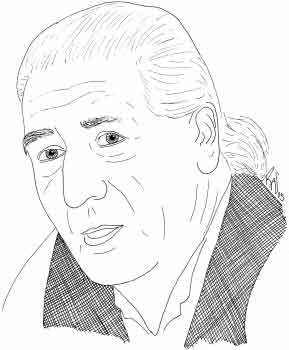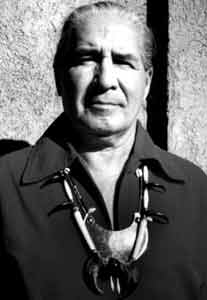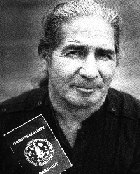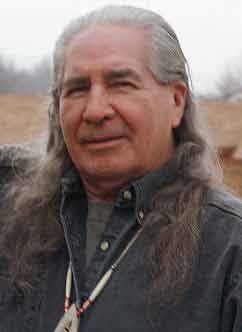Oren Lyons
"When
we
walk upon Mother Earth, we always plant our feet carefully
because we
know the faces of our future generations are looking up at
us from
beneath the ground.
We never forget them. In the absence of the sacred, nothing
is sacred.
Everything is for sale."
Oren R. Lyons is a traditional Faithkeeper of the Turtle Clan, and a member of the Onondaga
Nation Council of Chiefs of the Six Nations of the Iroquois Confederacy. He is Professor of American Studies at the State University of New York at Buffalo, where he directs the Native American Studies Program.
Oren Lyons was born in 1930 and raised in the traditional lifeways of the Iroquois on the Seneca and Onondaga reservations in northern New York state. After serving in the Army, he graduated in 1958 from the Syracuse University College of Fine Arts. He then pursued a career in commercial art in New York City, becoming the art and planning director of Norcross Greeting Cards with 200 artists under his supervision. He has exhibited his own paintings widely and is noted as an American Indian artist.
Since his return to Onondaga in 1970, Chief Lyons has been a leading advocate for American Indian causes. He is recognized not only in the United States and Canada but internationally as an eloquent and respected spokesperson on behalf of Native peoples. He is a sought-after lecturer or participant in forums in a variety of areas, including not only American Indian traditions, but Indian law and history, human rights, environment and interfaith dialogue, and has received numerous honors and awards.
For over fourteen years he has taken part in the meetings in Geneva of Indigenous Peoples of the Human Rights Commission of the United Nations, and helped to establish the Working Group on Indigenous Populations in 1982. He serves on the Executive Committee of the Global Forum of Spiritual and Parliamentary Leaders on Human Survival, and is a principal figure in the Traditional Circle of Indian Elders, an annual council of traditional grassroots leadership of the major Indian nations of North America. He was a negotiator between the governments of Canada, Quebec, and New York State and the Mohawk Indians in the crisis at Oka during the summer of 1990, and led a delegation of seventeen American Indian leaders which met with President Bush in Washington on April 16, 1991.
A lifelong lacrosse player, Oren Lyons was an All-American in this sport, which was invented by the Iroquois, and the Syracuse University team had an undefeated season during his graduating year. He is currently Honorary Chairman of the Iroquois Nationals Lacrosse Team, which competed in the summer of 1990 at the World Games in Perth, Australia, against the national teams of the United States, Canada, Great Britain and Australia. In 1989 he was named Man of the Year in Lacrosse by the National Collegiate Athletic Association.
Chief Lyons was the subject of a one-hour television documentary produced and hosted by Bill Moyers, which was broadcast on PBS on July 3, 1991. He has authored numerous books including Exiled in the Land of the Free; Democracy, Indian Nations, and the U.S. Constitution; as well as Voice of Indigenous Peoples (1992), and Native People Address the United Nations (1994), both by Clear Light Publishers, Santa Fe, NM.
Chief Lyons is a tenured professor of American Studies at the State University of New York, Buffalo.
Speeches/Videos
Indigenous Native American Prophecy - Part 2
Indigenous Native American Prophecy - Part 3
Indigenous Native American Prophecy - Part 5
Oren Lyons: Value Change for Survival
"For all of us. I am
Oren Lyons, Haudenosaunee, and speaking on behalf of the
Indigenous
People of North America, this Great Turtle Island. Mr.
President,
distinguished delegates, Chiefs, Clan Mothers, Leaders and
Members of
the World's Indigenous Nations and Peoples, we thank you,
The General
Assembly, for the recognition and the proclamation of "1993,
The
International Year of the Indigenous Peoples," for the theme
of,
"Indigenous Peoples, a New Partnership." We thank Madam
Chairman Repal
Chur (sp?) of the Working Group for Indigenous Populations
for
consistent, enthusiastic support, and Diaz. And at this
time, we
recognize the inspiration and spiritual force of Augusto
Williamson
Diaz, for his vision of such a day as this, and our
gratitude to those
leaders of Indigenous Peoples and people who also had the
vision of
this day for our people, who put their blood, their sweat
and their
tears into this moment. And to those who are no longer here,
our
profound gratitude and appreciation."
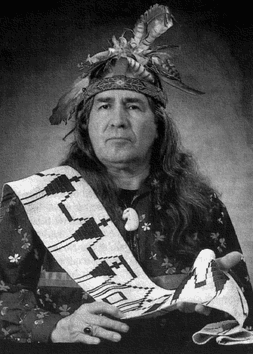
 Return to
Indigenous Peoples' Literature
Return to
Indigenous Peoples' Literature
Compiled by: Glenn Welker
Copyright © 1993-2013
This page last updated 05/30/2019 01:12:38
This site has been accessed over 10,000,000 times since
February 8,
1996.
